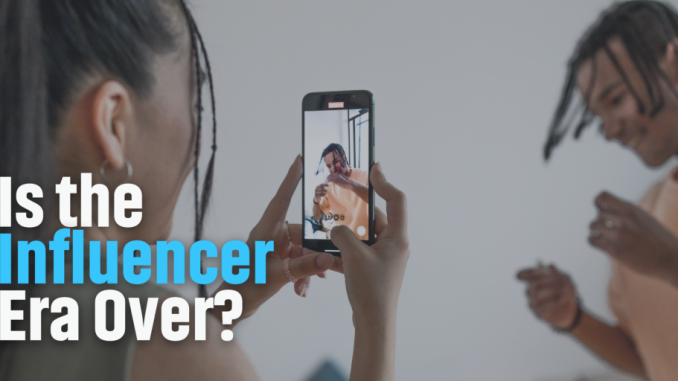
In the past decade, we have seen the rise of influencer marketing across many industries but we might be about to witness the fall too. We first saw the concept of influencer marketing in the mid-2000s when social media platforms like Facebook, Instagram, and YouTube started to become more popular. As social media grew more popular, the path to becoming a content creator became easier. It became even easier with the introduction of TikTok and the rise of micro-influencers. This brings us to: If everyone is an influencer, is anyone an influencer? Understanding the Influencer Landscape Influencer marketing is all about leveraging individuals with significant online followings to promote products or services, often through sponsored content. This form of marketing has reshaped the way brands connect with consumers. By connecting with consumers through content creators, brands seem more approachable and trustworthy. There are many brands who entered the influencer space early on and were able to grow their brands majorly with the help of content creators. These brands quickly became something everyone wanted just because their favorite content creators were endorsing them. A few of these brands are Glossier, Gymshark, and Kettle and Fire, among many others. Signs of Transition Influencer marketing at its core has always been about authenticity and real people. However, as influencers earn more money, their lifestyle changes and they become less relatable in some cases. Today’s consumers still crave genuine connections and value transparency over polished presentations. As a result, traditional influencer tactics may no longer resonate as strongly. We started to see a shift of interest in influencers in the past few years and the solution seemed to be micro influencers. However, this led to saturation in the influencer space. TikTok seemed to accelerate the influencer lifecycle by making regular people who were not planning on becoming influencers go viral and develop into influencers. The introduction of TikTok Shop also created a platform where people could review different products and earn commissions no matter who they were. This led people to doubt the credibility of the reviews even more. This dilution of authenticity poses a challenge for both influencers and brands seeking genuine engagement. It seems that consumers are starting to get fatigued with branded and sponsored content. This is not only bad for influencers but also for brands trying to stand out. This brings us back to the question: If everyone is an influencer, is anyone an influencer? The Case for Adaptation Authenticity remains the cornerstone of successful influencer marketing campaigns. Brands must collaborate with influencers who align with their values and empower them to create genuine, relatable content. This means brands need to start vetting influencers and looking at all aspects of their lives. Brands also need to know when it is appropriate to have guidelines for how their content is created and when to give complete freedom to the content creators. Brands might also start thinking about “making” their own influencers. They might need to think about bringing someone into their full-time team with the whole purpose of being their exclusive influencer. Something like Jake from State Farm but with their own brand to support the main brand. Someone who is doing something like this is Duolingo. They started with their owl but now, Duo the owl is in its own way an influencer of sorts. This solution would not bring back the authenticity content creators once brought but it might make the brand itself more relatable and authentic. The Future of Influence As the influencer landscape evolves, new trends and opportunities are emerging, such as the rise of virtual influencers and the importance of niche communities. These developments present exciting possibilities for brands to engage with consumers in innovative ways. Consumers will always crave authenticity and connection from brands so if not through influencers, brands should offer these in other ways. While the influencer era may be evolving, the concept of influence itself remains relevant. In a post-influencer era, influence may be redefined beyond follower counts, focusing more on genuine connections, expertise, and advocacy. To recap: Influencers rose in popularity quickly but we might be about to witness their descent. People can see through the manicured picture-perfect brand deals so influencers’ input is not as powerful. Brands need to start thinking about what it would look like to not work with influencers at all. Brands should start thinking about how they can bring authenticity back into their marketing strategy. Latest posts by Lenny Jimenez (see all)

Leave a Reply